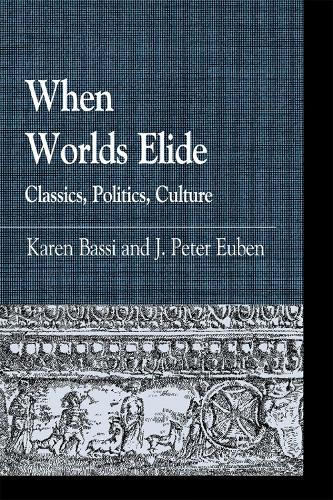
When Worlds Elide: Classics, Politics, Culture
(Paperback)
Publishing Details
When Worlds Elide: Classics, Politics, Culture
By (Author) Karen Bassi
Edited by Peter J. Euben
Contributions by Carla Antonaccio
Contributions by Noriko Aso
Contributions by P J. Brendese
Contributions by Peter Burian
Contributions by Diskin Clay
Contributions by Carol Dougherty
Contributions by J Peter Euben
Contributions by Roxanne L. Euben
Bloomsbury Publishing PLC
Lexington Books
25th March 2010
United States
Classifications
Professional and Scholarly
Non Fiction
320.01
Physical Properties
Paperback
490
Width 155mm, Height 230mm, Spine 36mm
721g
Description
For better or worse, the ancient Greeks retain their cultural, political, and philosophical authority for contemporary educators and actors. Maureen Dowd has talked about the Hellenization of the Bush administration, Thucydides has been used as a template to analyze the Iraqi War and the War on Terror, Greek drama has been repeatedly performed in sometimes spectacular if unconventional ways, while the Trojan War, the battle of Thermopylae, the Spartans, and Alexander have all been the subjects of recent films. Last year the New York Times carried a front page story about "conservatives" taking a "new tack" by establishing "beachheads" for programs in Western Civilization and American Institutions in which the ancient Greeks hold pride of place.
The contributors to When Worlds Elide are also invested in having Greek philosophy, literature, and political theory taken seriously in contemporary debates-whether over modes of interpreting Plato, Athenian democracy, gender, ethnicity, or materiality. What distinguishes this book is the substantive range of the essays in it and the generative potentialities of "using" ancient authors and events in analyzing these debates. It begins from the premise that "the Greeks" (like "the French" or "the Chinese") obscures the contested histories of ethnic, geographic, and political formations in favor of an idealized dehistoricized collectivity. The also book also illustrates the ways in which ancient texts must be understood within the history of interpretative practices, which means that "the Greeks" are more a moving target than a stable entity, and that each generation of interlocutors formulates continually transforming questions, readings, and arguments.
Finally, this book supposes that an interrogation of "the Greek legacy" depends on interdisciplinary work where interdisciplinarity functions as a verb-that is, something that is always in the process of being achieved.
Reviews
Anyone who has doubted the value of antiquity for the twenty-first century will come away from this book a true believer in the relevance of classics to the most pressing contemporary concerns. Far from offering easy solutions or facile analogies, When Worlds Elide boldly critiques classics itself in relation to nationalism, elites, material culture, and the structure of the university. This is a must-read resourcelucid, complex and excitingfor those interested in abiding questions: What makes a community Who should lead What is ethical How do we reconcile money and political ambition -- Richard P. Martin, Stanford University
This exciting collection, with its stellar list of contributors, sets a bold agenda for the interdisciplinary study of classics and politics in the twenty-first century. It proves that it is indeed possible to conjoin theoretical insight with erudition and a passionate commitment to the enduring significance of Greek antiquity. -- Josiah Ober, Stanford University
Author Bio
J. Peter Euben is research professor of political science and classical studies and Kenan Distinguished Faculty Fellow in Ethics at Duke University.
Karen Bassi is professor of classics in Clowell College at University of California Santa Cruz.
